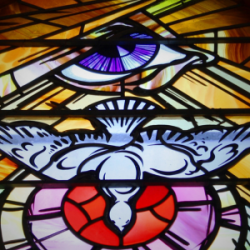
Members of The Church of Jesus Christ of Latter day Saints (known as Mormons) recognize four sacred texts, and the Bible is one of them. (The others are the Book of Mormon, the Doctrine and Covenants, and the Pearl of Great Price.) They fully accept the sacred narrative of the Bible, from the creation through the end of the ages—Genesis to Revelation. They do, however, sometimes have different interpretations of some parts of the text from other Christians. These interpretations, along with what is taught in the other three texts, set Mormons apart from their brothers and sisters in other Christian denominations.
For example, Mormonism teaches that Jesus Christ was Jehovah, the God of the Old Testament, who, in turn, is not God the Father. While they worship the Father, in the name of the Son, and through the Holy Spirit, they use the term "Godhead" instead of "Trinity" when describing the three divine persons. The earth was created from eternally existing elements (ex materia instead of ex nihilo). There is a Heavenly Mother as well as a Heavenly Father. These teachings are all supported by the various canonical books of Mormonism, and by other prophetic teachings of their tradition. Members of The Church of Jesus Christ of Latter-day Saints accept completely the Gospel stories of the life, death, and resurrection of Jesus Christ.
Most Mormons argue that they follow the Bible and biblical teachings. In their eyes, the other texts do not detract from the Bible but further develop its ideas. Some of their additional sacred scriptures enhance biblical stories by adding details or episodes. While most Christians believe that the Bible is the primary source and ultimate authority of Christian faith and practice, Mormon faith places other authoritative material alongside of it. Consequently, their emphasis is not always the same as that found in other Christian traditions.
The Book of Mormon and the other extrabiblical texts are evidence of a key Mormon teaching; namely ongoing revelation. While most Christians believe that the canon is closed; that is, that God's revelation of the way of salvation is complete; Mormons believe that God is continuing to develop and reveal new truths. Thus, new revelations to Joseph Smith and to all the leaders of the LDS in their nearly 200 years of existence have helped to shape Mormon beliefs, practices, and culture in ways that are often different from other Christian traditions.
Members of The Church of Jesus Christ of Latter-day Saints also reject some of the theology that Christianity has developed based on post-biblical creeds. For example, while many Christians believe the Bible teaches the reality of a Triune God; three eternal Persons in one essence; Mormons perceive the Father, Son, and Holy Spirit as united in nature, but very much distinct in personhood. Many Christians believe that scripture teaches that God is spirit, while Latter-day Saint Christians believe that God is not simply spirit, but that he has a physical, resurrected body as well. These are just a few examples of how the same sacred text, the Holy Bible, is understood in different ways.
1/17/2023 8:17:49 PM







